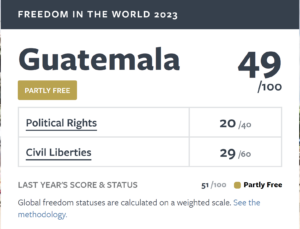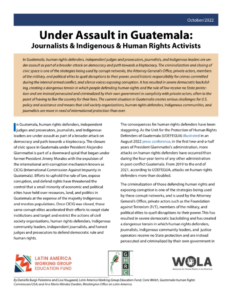The political earthquake in Guatemala amounts to “the most historic election in a generation, maybe two, maybe three,” said Will Freeman of the Council on Foreign Relations.
 “This is Guatemala’s best shot at turning the corner from decades of corruption, of capture of the state by criminal organizations,” he told PBS (above). “Arévalo is giving Guatemalans a sense of hope that I don’t think they have had, that I haven’t seen in my time visiting the country for years.”
“This is Guatemala’s best shot at turning the corner from decades of corruption, of capture of the state by criminal organizations,” he told PBS (above). “Arévalo is giving Guatemalans a sense of hope that I don’t think they have had, that I haven’t seen in my time visiting the country for years.”
The election could lead to a second “Democratic Spring“, some observers suggest.
Eduardo Núñez, the Guatemala resident senior director for the National Democratic Institute (NDI), expected two trends to continue and intensify in the coming days: the country’s polarization and the judicialization of the electoral process. He said there will be three key moments, PBS reports:
- the immediate positions staked out by Arévalo’s Seed Movement and Torres’ National Unity of Hope party about the results;
- then on Oct. 31, when Guatemala’s electoral process officially ends and the Seed Movement will no longer enjoy the legal protection that would keep it from being canceled, and
- finally on Jan. 14, when [outgoing President Alejandro] Giammattei is constitutionally mandated to leave office.
“It is likely that there could be a series of official actions that look to modify in one way or another what happened in the June elections and what could happen now in the August elections,” Núñez said.
 When Arévalo of the anti-corruption Seed Movement emerged as a surprise runner-up in June’s first round election, Guatemala’s Public Ministry (the equivalent of the attorney general) requested that his party’s registration (and thus, Arévalo’s candidacy) be revoked over allegations of signature irregularities in the filing paperwork that established the political party, the Bush Institute’s Jessica Ludwig noted.
When Arévalo of the anti-corruption Seed Movement emerged as a surprise runner-up in June’s first round election, Guatemala’s Public Ministry (the equivalent of the attorney general) requested that his party’s registration (and thus, Arévalo’s candidacy) be revoked over allegations of signature irregularities in the filing paperwork that established the political party, the Bush Institute’s Jessica Ludwig noted.
Although Guatemala’s constitutional court ruled in favor of the Supreme Electoral Tribunal’s authority over election proceedings and upheld an electoral law that prohibits the disqualification of candidates during an active election, some legal experts contend there remains an open possibility that Arévalo could face a reopened legal challenge to the legitimacy of his candidacy, even if he emerges as president-elect, she added. RTWT







